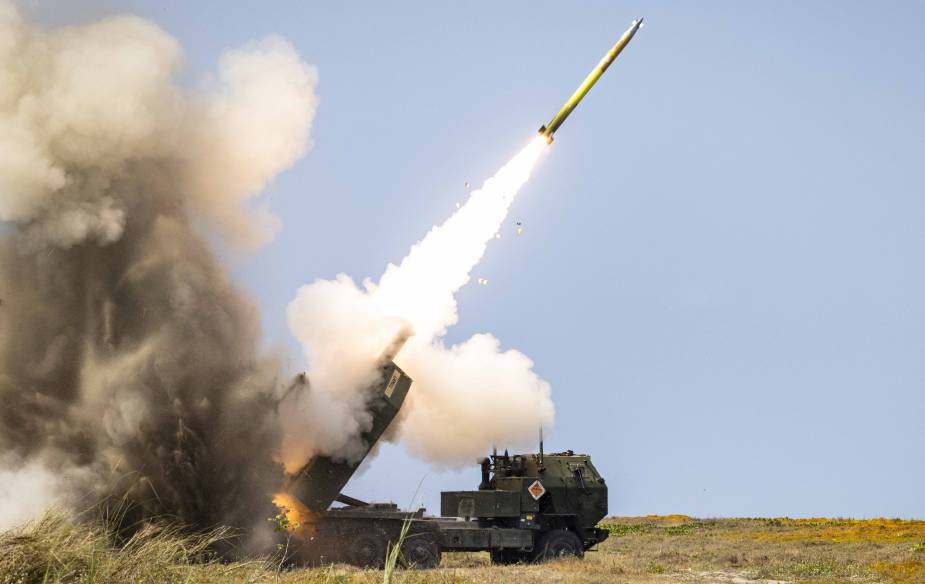Breaking news
US - Philippine forces sink target ship for first time in Balikatan exercise.
A combined force of U.S. and Philippine service members participated in a combined joint littoral live-fire exercise on April 27, the culminating field training event for Balikatan 2023. Approximately 1,400 Marines, soldiers, sailors, airmen and Coast Guardsmen from both countries took part in the training, which involved detecting, identifying, targeting and engaging a target ship using a variety of ground and air-based weapons systems.
Follow Navy Recognition on Google News at this link
 A U.S. Army M142 HIMARS fires during a littoral live fire event during Balikatan 23 at the Naval Education, Training and Doctrine Command of the Philippines on April 26, 2023 (Picture source: USMC/Sgt. Samuel C. Fletcher)
A U.S. Army M142 HIMARS fires during a littoral live fire event during Balikatan 23 at the Naval Education, Training and Doctrine Command of the Philippines on April 26, 2023 (Picture source: USMC/Sgt. Samuel C. Fletcher)
“This training increased the exercise’s realism and complexity, a key priority shared between the Armed Forces of the Philippines and the U.S. military,” said Lt. Gen. William Jurney, commander of U.S. Marine Corps Forces, Pacific, and the U.S. director for the exercise. “Together we are strengthening our capabilities in full-spectrum military operations across all domains.”
Balikatan is the largest annual exercise between the two allies and 2023 marks its 38th iteration and the largest iteration to date, with more than 17,600 participants. It provides an opportunity for the two militaries to enhance cooperation, increase capabilities and improve interoperability.
During the exercise, U.S. and Philippine weapons platforms delivered coordinated fires on a target ship, a decommissioned Philippine Navy corvette towed into Philippine territorial waters. Bilateral weapons systems consisted of U.S. and Philippine artillery, High-Mobility Artillery Rocket Systems, Avenger air defense systems, AH-64 Apache attack helicopters, Philippine Air Force FA-50 Golden Eagle fighter-attack aircraft, F-16 Fighting Falcons, U.S. Marine Corps F-35B Lightning IIs, and a U.S. Air Force Special Operations Command AC-130 Spectre gunship.
The Balikatan exercise has increased in complexity and high-end warfighting mission sets over the past several years. A focus point in Balikatan 2023 was bilateral integration of command and control, sensors, and multi-domain fires. This enabled expanded battlefield awareness, the sharing of targeting data between geographically dispersed units, and precision strikes in a contested maritime environment.
During the littoral live-fire event, a U.S. Marine Corps command and control and sensor network enabled the various firing platforms to sense their target, develop firing solutions, and deliver precision integrated fires against the target vessel. The training event represented a tangible demonstration of the U.S.-Philippine commitment to strengthen military capabilities and interoperability to meet shared modern-day security challenges.
“This significant activity demonstrated new potential and revitalized the strength of our militaries while we continuously forge an ironclad alliance,” said Armed Forces of the Philippines Maj. Gen. Marvin L. Licudine, commander of the AFP’s Education, Training and Doctrine Command and the Balikatan 2023 exercise director for the AFP. “This event enhanced the interoperability of the Philippines and U.S. forces in conducting combined joint operations utilizing both countries’ army, navy, and air force assets in conducting maritime security and territorial defense.”
The training successfully advanced combined military modernization and capability development by furthering the opportunities for both Philippine and U.S. forces to work together in a complex and realistic training environment.
Balikatan is a Tagalog term that means “shoulder-to-shoulder” or “sharing the load together,” which characterizes the spirit of the exercise and the alliance between the Philippines and the United States. This year’s iteration also included multilateral training activities with participation from a contingent of servicemembers from the Australian Defence Force.
Approximately 17,600 participants are taking part in the exercise, developing interoperability and enhancing bilateral capabilities in the areas of maritime security, amphibious operations, live-fire training, urban and aviation operations, cyber defense, counterterrorism, and humanitarian assistance and disaster relief preparedness.
The Philippines is a key U.S. ally and the largest recipient of U.S. military assistance, equipment, and training in the region. The U.S.-Philippines Mutual Defense Treaty was signed in 1951 and is America’s longest-standing defense treaty in the Indo-Pacific region. Together, the United States and the Philippines are committed to promoting regional peace and stability.


























